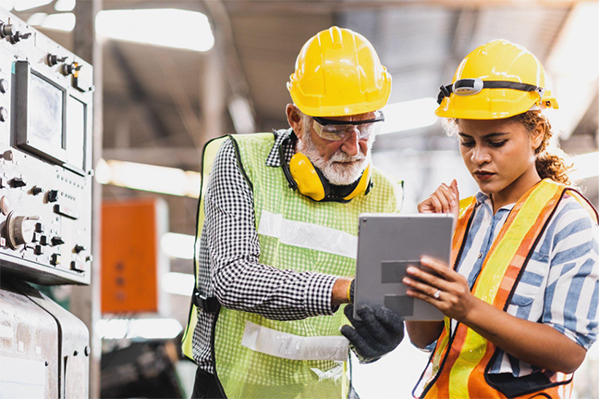In manufacturing, AI-driven knowledge transfer has emerged as a powerful solution to address an aging workforce and economic shifts.
By Sam Zheng, CEO of DeepHow
As Industry 4.0 continues to take center stage, manufacturing is set to embrace a new era of learning and development, fundamentally reshaping how knowledge is acquired, shared, and applied across the sector. The critical challenge lies in bridging the gap between the wealth of experience held by seasoned professionals and the emerging talent entering the industry. An indispensable solution to this challenge is the adoption of an AI-driven approach, specifically designed to capture the nuanced tacit knowledge that often resides in the minds of experienced individuals. This shift represents more than just a passing trend; rather, it emerges as a necessity vital for sustaining the growth and fostering innovation within the manufacturing sector.

Industry 4.0 represents the fourth industrial revolution, marked by the integration of digital technologies and automation in manufacturing. According to McKinsey, this wave of change in the manufacturing sector began in the mid-2010s and holds significant potential for operations and the future of production. In 2025, the value creation potential of Industry 4.0 for manufacturers and suppliers is expected to reach $3.7 trillion.
With interconnected systems driven by the Internet of Things (IoT), artificial intelligence, machine learning, and data analytics, smart factories are emerging to streamline operations, enhance predictive maintenance, and enable real-time monitoring, leading to minimized downtime and optimized resource allocation. Additionally, by merging cyber-physical systems and robotics, manufacturing is becoming more agile and responsive to changing demands, ultimately accelerating time-to-market and fostering a new era of adaptable, customer-centric production methodologies.
Within this landscape lies a unique opportunity to harness the power of AI for the enrichment of learning and development initiatives.
A recent survey from the National Association of Manufacturers highlights that attracting and keeping a skilled workforce remains a major concern for the manufacturing industry. The ongoing economic challenges have intensified a labor shortage, particularly due to the aging workforce and the gradual retirement of the baby boomer generation. As more than 75 million baby boomers are set to retire, it becomes crucial for manufacturers not only to develop a robust plan for replacing outgoing workers but also to find ways to preserve the valuable knowledge and expertise—the oral history—that is disappearing with these experienced professionals.
AI-driven systems play a pivotal role in capturing this tacit knowledge by deciphering complex patterns and behaviors, enabling machines to learn from human expertise. Through advanced algorithms, AI can analyze vast datasets, uncover implicit insights, and emulate human decision-making processes. This approach not only preserves the wisdom of skilled workers but also ensures its accessibility and applicability across manufacturing processes, fostering innovation, efficiency, and adaptability in an ever-evolving industrial landscape.
Embracing AI-driven solutions in knowledge transfer brings forth a myriad of benefits that not only address the challenges associated with an aging workforce but also contribute to the development and efficiency of new personnel within the manufacturing sector:
Manufacturers today face a unique set of challenges when it comes to training a diverse, multi-shift, and global workforce. The manufacturing sector often operates around the clock, with different teams in any number of locations working various shifts. This multi-shift, dispersed environment creates a need for consistent and accessible training methods that cater to all employees, regardless of their work schedule, location, or language spoken.
Video training platforms are emerging as a compelling option due to their ability to solve these challenges by harnessing AI technologies like NLP and computer vision. These platforms facilitate the seamless transmission of expertise by capturing real-world manufacturing processes through step-by-step training videos. The integration of AI in video training not only condenses the learning curve but also enhances the accessibility of knowledge.
By leveraging technologies such as speech-to-text, object recognition, and semantic segmentation, these platforms enable the automatic extraction and translation of expert insights. This not only accelerates the dissemination of critical skills but also addresses the challenges of language barriers, making the manufacturing workforce more versatile and globally connected. As a result, AI-driven video training platforms are becoming integral in fostering efficient and comprehensive knowledge transfer within the manufacturing industry.
As we continue to navigate the complexities posed by an aging workforce and changing economic dynamics, the role of AI-driven knowledge transfer has emerged as a powerful solution in manufacturing. It not only preserves the invaluable wisdom of experienced professionals but also propels the manufacturing industry into a future marked by innovation, efficiency, and adaptability. The incorporation of AI in video training further democratizes accessibility, ensuring that expertise transcends the boundaries of time, location, and language, thereby shaping a globally connected and versatile manufacturing workforce.

Sam Zheng, CEO and co-founder of DeepHow, spearheads a rapidly evolving startup that revolutionizes skilled workforce training with an AI-powered, video-centric knowledge-capturing and transfer platform. Prior to DeepHow, Zheng dedicated more than a decade to Siemens, driving digital innovation across various industries. His projects, such as the Cloud Digital Inspection Jacket, have improved technical knowledge sharing, efficiency, and user experience, earning his team the Siemens Innovation Award. Zheng also serves as an adjunct professor of Psychology at Tsinghua University and holds a Ph.D. in Engineering Psychology and a Master’s in Statistics from the University of Illinois at Urbana-Champaign.
Scott Ellyson, CEO of East West Manufacturing, brings decades of global manufacturing and supply chain leadership to the conversation. In this episode, he shares practical insights on scaling operations, navigating complexity, and building resilient manufacturing networks in an increasingly connected world.